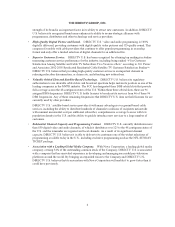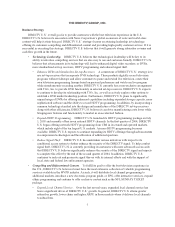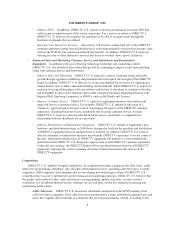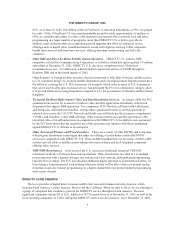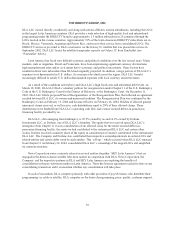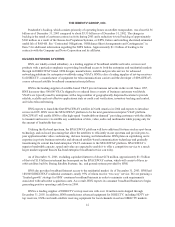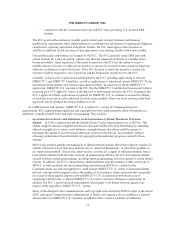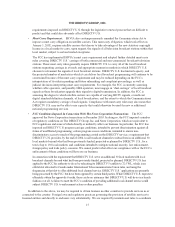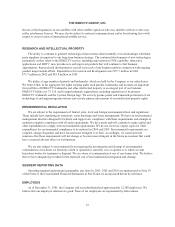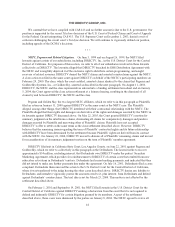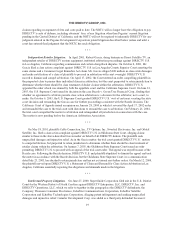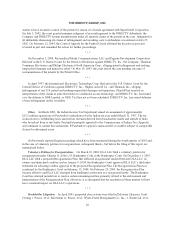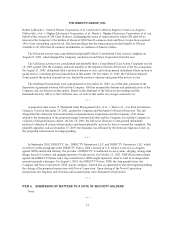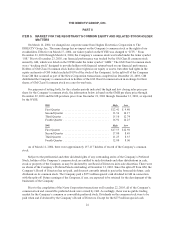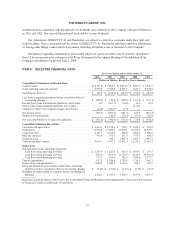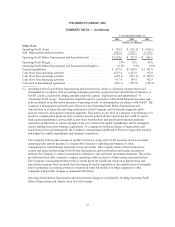DIRECTV 2003 Annual Report Download - page 22
Download and view the complete annual report
Please find page 22 of the 2003 DIRECTV annual report below. You can navigate through the pages in the report by either clicking on the pages listed below, or by using the keyword search tool below to find specific information within the annual report.THE DIRECTV GROUP, INC.
requirements imposed on DIRECTV U.S. through the legislative renewal process that are difficult to
predict and that could also adversely affect DIRECTV U.S.
•Must Carry Requirement. SHVIA also contemporaneously amended the Communications Act to
impose a must carry obligation on satellite carriers. This must carry obligation, which took effect on
January 1, 2002, requires satellite carriers that choose to take advantage of the new statutory copyright
license in a local market to carry, upon request, the signals of all television broadcast stations within that
local market, subject to certain limited exceptions.
The FCC has implemented SHVIA’s must carry requirement and adopted further detailed must carry
rules covering DIRECTV U.S.’ carriage of both commercial and non-commercial broadcast television
stations. These must carry rules generally require DIRECTV U.S. to carry all of the local broadcast
stations requesting carriage in a timely and appropriate manner in markets in which DIRECTV U.S.
chooses to retransmit the signals of local broadcast stations. DIRECTV U.S. has limited capacity, and
the projected number of markets in which it can deliver local broadcast programming will continue to be
constrained because of the must carry requirement and may be reduced depending on the FCC’s
interpretation of its rules in pending and future rulemaking and complaint proceedings, as well as
judicial decisions interpreting must carry requirements. For example, the FCC is currently assessing
whether cable operators, and possibly DBS operators, must engage in “dual carriage” of local broadcast
signals as these broadcasters upgrade their signals to digital transmission. In addition, the FCC is
assessing the degree to which satellite carriers are capable of carrying HDTV signals, or multicast
digital standard-definition channels, of local broadcasters, and the extent to which the Communications
Act requires mandatory carriage of such signals. Compliance with must carry rules may also mean that
DIRECTV U.S. may not be able to use capacity that could otherwise be used for new or additional
national programming services.
•FCC Conditions Imposed In Connection With The News Corporation Transactions. The FCC
approved the News Corporation transactions in December 2003. In doing so, the FCC imposed a number
of regulatory conditions on The DIRECTV Group, Inc. and News Corporation, which are equivalent to
FCC regulations and some of which directly or indirectly affect our business. In particular, the FCC has
imposed on DIRECTV U.S. program carriage conditions, intended to prevent discrimination against all
forms of unaffiliated programming; certain program access conditions, intended to ensure non-
discriminatory access to much of the programming carried on the DIRECTV service; a requirement that
DIRECTV U.S. provides, by the end of 2004, local broadcast channels to subscribers in an additional 30
local markets beyond what had been previously funded, projected or planned by DIRECTV U.S., for a
total of up to 130 local markets; and conditions intended to mitigate national security, law enforcement,
foreign policy and trade policy concerns. We cannot predict what effect our compliance with or the FCC’s
enforcement of these conditions will have on our business.
In connection with the requirement that DIRECTV U.S. serve an additional 30 local markets with local
broadcast channels beyond what had been previously funded, projected or planned, DIRECTV U.S. has
applied to the FCC for authority to do so by relocating its DIRECTV 5 satellite to 72.5 WL, which is an
orbital slot allocated to Canada under International Telecommunications Union rules, and using the
frequencies at that slot to offer additional local channel service. DIRECTV U.S.’ applications are presently
being processed by the FCC, but have been opposed by certain third parties. While DIRECTV U.S. expects to
ultimately obtain the approvals it seeks, there can be no assurance that DIRECTV U.S. will do so in a timely
fashion or at all. A failure to meet the FCC’s condition of providing additional local channel service could
subject DIRECTV U.S. to enforcement action or other penalties.
In addition to the above, we may be required to obtain licenses in other countries to provide services in or
connected to the country. Foreign laws and regulatory practices governing the provision of satellite services to
licensed entities and directly to end users vary substantially. We are required by international rules to coordinate
15



